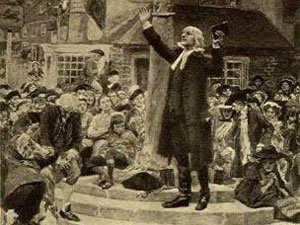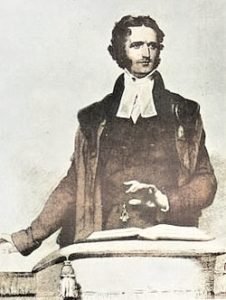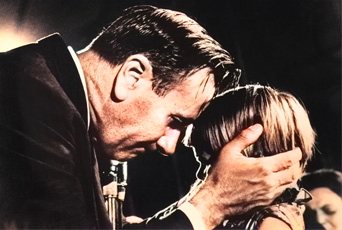HEALING IN THE 18TH-19TH CENTURIES
JANSENISTS (ca. 1731)

Cornelius Jansen
“The expectation of miracles and other supernatural signs had become almost an integral part of the Jansenist worldview by the end of the seventeenth century. ….writes Robert Kreiser in his book ‘Miracles, Convulsions, and Ecclesiastical Politics in Early Eighteenth Century Paris.’
One such miracle that he records is the cure of Pascal’s niece in March 1656. Marguerite had been suffering for a long time from a serious and disfiguring lachrymal fistula in the corner of her eye. She was healed when a Holy Thorn was simply touched to her eye. The miracle was supported by substantial medical evidence and made a profound impression on the public.
The appeal to, and ideological exploitation of, miracles in times of political adversity had a long history in the Jansenist controversy, dating back to the mid-seventeenth century. Throughout this stormy period there had been a large number of miraculous cures as well as a variety of other “supernatural” signs and portents associated with Port-Royal, all of which served to sustain the Jansenists’ sense of themselves as specially chosen religious elite. Recourse to the miraculous and appeal for supernatural aid – whether for cures of specific physical disabilities or out of a need for celestial comfort in the face of official persecution – became an almost daily occurrence in certain Jansenist circles. Increasingly, the miracle, which bore direct and unequivocal witness to the divine presence, came to constitute perhaps the most important vehicle of expression available to the persecuted Jansenist faithful. The miracle was God’s way of giving “voice” to the previously stifled and frustrated partisans of the “Truth”, of enabling them not only to “speak out” but to do so effectively, with a “language” of extraordinary force and conviction. It thus provided the Jansenists with a powerful apologetic weapon. (Kreiser 1978, 70-72)

John Wesley
JOHN WESLEY (1703-1791)
John Wesley was the founder of the Methodist Church. The fifteenth child of the Wesley family, he was educated at Oxford and ordained in 1728. Wesley was certainly exposed to the ministry of Signs and Wonders by having seen some of his contemporaries involved. He at one time interviewed a “French prophet” from the Huguenot movement in 1739 and in 1786 he was exposed to the Welsh Revival.
Wesley had some “charismatic experiences” himself. In his Journal he writes:
Tues., Oct. 23, 1739 – In riding to Bradford I read over Mr. Law’s book on the New Birth: philosophical, speculative, precarious: Behmenish, void, and vain! “) what a fall is there!” At eleven I preached at Bearfield to about three thousand, on the spirit of nature, of bondage, and of adoption. Returning in the evening, I was exceedingly pressed to go back to a young woman in Kingswood. (The fact I nakedly relate, and leave every man to his own judgement of it.) I went. She was nineteen or twenty years old; but, it seems, could not write or read. I found her on the bed, two or three persons holding her. It was a terrible sight. Anguish, horror, and despair, above all description, appeared in her pale face. The thousands of distortions of her whole body showed how the dogs of hell were gnawing her heart. The shrieks intermixed were scarce to be endured. But her stony eyes would not weep. She screamed out, as soon as words could find their way, “I am damned, damned; lost forever! Six days ago you might have helped me. But it is past. I am the devil’s now. I have given myself to him. His I am. Him I must serve. With him I must go to hell. I will be his. I will serve him. I will go with him to hell. I cannot be saved. I will not be saved. I must, I will, I will be damned!” She then began praying to the devil.
We began:
“Arm of the Lord, awake, awake!” She immediately sunk down asleep; but as soon as we left off, broke out again, with inexpressible vehemence: “Stony hearts, break! I am warning to you. Break, break, poor stony hearts! Will you not break? What can be done for stony hearts? I am damned that you may be saved. Now break, now break, poor stony hearts! You need not be damned, though I must.” She then fixed her eyes on the corner of ceiling, and said: “There he is: ay, there he is! Come, good devil, come! Take me away. You said you would dash my brains out: come do it quickly. I am yours. I will be yours. Come just now. Take me away.”
We interrupted her by calling again upon God: on which she sunk down as before: and another young woman began to roar out as loud as she had done. My brother now came in, it being about nine o’clock. We continued in prayer till past eleven; when God in a moment spoke peace into the soul, first of the tormented, and then of the other. And they both joined in singing praise to Him who had “stilled the enemy and the avenger.”
Sat., Oct. 27, 1739 – I was sent for to Kingswood again, to one of those who had been so ill before. A violent rain began just as I set out, so that I was thoroughly wet in a few minutes. Just at that time the woman (then three miles off) cried out, “Yonder comes Wesley, galloping as fast as he can.” When I was come, I was quite cold and dead, and fitter for sleep than prayer. She burst out in a horrid laughter, and said, “No power, no power; no faith, no faith. She is mine; her soul is mine. I have her, and will not let her go.”
We begged of God to increase our faith. Meanwhile her pangs increased more and more; so that one would have imagined, by the violence of the throes, her body must have been shattered to pieces. One who was clearly convinced this was no natural disorder, said, “I think Satan is let loose. I fear he will not stop here.” And added, “I command thee, in the name of the Lord Jesus, to tell if thou hast commission to torment any other soul.” It was immediately answered, “I have. L–y C—r and S—h J — s.” (Two who lived at some distance, and were then in perfect health.)
We betook ourselves to prayer again; and ceased not till she began, about six o’clock, with a clear voice and composed, cheerful look: “Praise God from whom all blessings flow.”
Sun., Oct. 28, 1739 – I preached once more at Bradford, at one in the afternoon. The violent rains did not hinder more, I believe, than ten thousand from earnestly attending to what I spoke on those solemn words: “I take you to record this day that I am pure from the blood of all men. For I have not shunned to declare unto you all the counsel of God.”
Returning in the evening, I called at Mrs. J—‘s, in Kingswood. S—h J—s and L—y C—r were there. It was scarce a quarter of an hour before L—y C—r fell into a strange agony; and presently after, S—h J — s. The violent convulsions all over their bodies were such as words cannot describe. Their cries and groans were too horrid to be borne, till one of them, in a tone not to be expressed, said: “Where is your faith now? Come, go to prayers. I will pray with you. ‘Our Father, which art in heaven.’ We took the advice, from whomsoever it came, and poured out our souls before God, till L—y C — r’s agonies so increased, that it seemed she was in the pangs of death. But in a moment God spoke: she knew His voice; and both her body and soul were healed.
Fri., May 8, 1741 – I found myself much out of order. However, I made shift to preach in the evening: but on Saturday my bodily strength quite failed, so that for several hours I could scarce lift up my head. Sunday, May 10 – I was obliged to lie down most part of the day, being easy only in that posture. Yet in the evening my weakness was suspended, while I was calling sinners to repentance. But at our love-feast which followed, beside the pain in my back and head, and the fever which still continued upon me, just as I began to pray, I was seized with such a cough, that I could hardly speak. At the same time came strongly into my mind, “These signs shall follow them that believe.” I called on Jesus aloud, to “increase my faith,” and to “confirm these words of His grace.” While I was speaking my pain vanished away; the fever left me; my bodily strength returned; and for many weeks I felt neither weakness nor pain. “Unto thee, O Lord, do I give thanks.”
Mon., March 17, 1746 – I took my leave of Newcastle, and set out with Mr. Downes and Mr. Shepherd. But when we came to Smeton, Mr. Downes was so ill, that he could go no further. When Mr. Shepherd and I left Smeton, my horse was so exceedingly lame that I was afraid I must have lain by too. We could not discern what it was that was amiss; and yet he would scarce set his foot to the ground. By riding thus seven miles, I was thoroughly tired, and my head ached more than it had done for some months. (What I here aver is the naked fact: let every man account for it as he sees good.) I then thought, “Cannot God heal either man or beast, by any means, or without any?” Immediately my weariness and headache ceased, and my horse’s lameness in the same instant. Nor did he halt any more either that day or the next. A very odd accident this also!
Wed., Aug. 15, 1750 – By reflecting on an odd book which I had read in this journey, The General Delusion of Christians with Regard to Prophecy, I was fully convinced of what I had long suspected: (1) That the Montanists, in the second and third centuries, were real, scriptural Christians; and (2) That the grand reason why the miraculous gifts were so soon withdrawn, was not only that faith and holiness were well-nigh lost, but that dry, formal, orthodox men began even then to ridicule whatever gifts they had not themselves, and to decry them all as either madness or imposture.
Sept. 19, 1750 – When I came home in the evening, I found my brother abundantly worse. He had had no sleep for several nights; and expected none, unless from opiates. I went down to our brethren below, and we made our request known to God. When I went up again he was in a sound sleep, which continued till the morning.
Wesley wrote a letter to Thomas Church in June 1746 in which he states:
Yet I do not know that God hath anyway precluded Himself from thus exerting His sovereign power from working miracles in any kind or degree in any age to the end of the world. I do not recollect any scripture wherein we are taught that miracles were to be confined within the limits either of the apostolic or the Cyprianic age, or of any period of time, longer or shorter, even till the restitution of all things. I have not observed, either in the Old Testament, or the New, any intimation at all of this kind. St. Paul says, indeed, once, concerning two of the miraculous gifts of the Spirit (so, I think, that test is usually understood), “Whether there be prophecies, they shall fail; whether there be tongues, they shall cease.” But he does not say, either that these or any other miracles shall cease till faith and hope shall cease also, till they all be swallowed up in the vision of God, and love be all in all. (Telford, The Letters of John Wesley, nd. 2:261).

Edward Irving

Edward Irving
EDWARD IRVING (1792-1834) & THE CATHOLIC APOSTOLIC CHURCH
Irving was born in Scotland and educated in Edinburgh. The Catholic Apostolic Church grew out of the Conference for Biblical Study at Albury Park, Surrey, in 1826. Through the influence of Irving, many who attended these meetings came to believe that the special gifts of the apostolic age were a permanent endowment of the Church. Irving and the church were full blown “charismatics.” They had speaking in tongues. The first occurrence was recorded as taking place April 30, 1831 in London (Drummond, Edward Irving and His Circle, nd. 153). They had singing in tongues (160).
They had healings:
Margaret MacDonald was dangerously ill. She had scarcely been able to have her bed made for a week. Dr. Norton says: “Mrs. — and myself had been sitting quietly at her bedside when the power of the Spirit came upon her. She said: ‘There will be a mighty baptism of the Spirit this day!’ and then broke forth in a most marvelous setting forth of the wonderful work of God; and as if her own weakness had been altogether lost in the strength of the Holy Ghost, continued with little or no intermission for two or three hours in mingled praise, prayer, and exhortation.”
“At dinner time James and George came home as usual, when she addressed them at great length, concluding with a solemn prayer for James, that he might at that time be endowed with the Holy Ghost. Almost instantly James calmly said, ‘I have got it.’ He walked to the window, and stood silent for a moment or two. I looked at him and almost trembled, there was such a change upon his whole countenance. He then, with a step and a manner of the most indescribable majesty, walked up to Margaret’s bedside, and addressed her in these words of the Twentieth Psalm – ‘Arise and stand upright.’ He repeated the words, took her by the hand, and she arose, when we all sat down quietly and had our dinner (Cp. Exodus 24:11: ‘They saw God, and did eat and drink’). After it, my brother went off to the building yard as usual, where James wrote over to Miss Campbell, commanding her in the name of the Lord to arise.
“The next morning, after breakfast, James said, ‘I am going down to the quay to see if Miss Campbell is coming across the water.’ (the Clyde), at which we expressed our surprise, as he had said nothing to us about having written her. The result showed how much he knew of what God had done, and would do for her; for she came as he expected, declaring herself perfectly whole.”
The following is Mary Campbell’s account of her experiences:
Two individuals who saw me before my recovery said that I never would be strong, that I was not to expect a miracle being wrought upon me, and that it was quite foolish in one who was in such a poor state of health, ever to think of going to the heathen.
I told them that they would hear of miracles very soon, and no sooner had the last-mentioned individuals left me that I was constrained of the Spirit to go and ask the Father, in the name of Jesus, to stretch forth His hand to heal. . . to ask in faith, nothing doubting, that by the next morning I might have some miracles to inform them of.
It was not long after that I received James MacDonald’s letter. I had scarcely read the first page when I became quite overpowered, and laid it aside for a few minutes; but I had no rest in my spirit until I took it up again and began to read. As I read, every word came with power, but when I came to the command to rise, it came home with a power no words can describe; it was felt to be indeed the voice of Christ… such a voice of power as could not be resisted.
I felt as if! had been lifted up from off the face of the earth, and all my disease taken off me. At the voice of Jesus I was surely made to stand upon my feet, leap and walk, sing and rejoice. O that men would praise the Lord…! (Reported by Rev. A. Robertson of Greenock in A Vindication of the Religion of the Land.)
JOHN BUSCO (ca. 1846)
In her book Gathering a People, Judith Tydings describes the healing of John Busco which occurred in 1846.
John came down with pneumonia and the doctor said he was going to die. The last sacraments were administered. A priest friend said to John: ‘Father John ask God to cure you.’ But John replied: ‘May God’s holy will be done!’ His friend said, ‘That is not sufficient. Make the prayer more specific. Ask God for your recovery for the sake of those five hundred boys.’ John obeyed and the next day he was convalescing! (Tydings nd., 213).
There were more!



